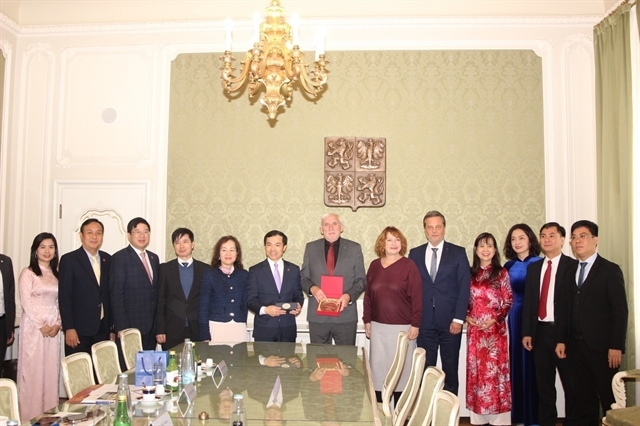During the trip, the delegation held meetings on November 11 with the Czech Senate, the Communist Party of Bohemia and Moravia, and the Centre for Asia–Pacific Studies. At the meetings, Czech leaders highlighted the traditional friendship and long-standing cooperation between the two countries, underscoring the significance of the 75th anniversary of diplomatic ties (1950–2025) and the decision to upgrade the bilateral relations to a Strategic Partnership in January 2025.
    |
 |
|
HCMA Deputy Director Nguyen Manh Hung (sixth from left) and his delegation, along with Czech senators |
They affirmed that Vietnam remains an important partner and promising market in Southeast Asia, noting strong opportunities for collaboration in the fields of investment, education and training, and digital transformation. Czech leaders also recognized the positive contributions of the Vietnamese community in the Czech Republic, which serves as an important bridge fostering bilateral friendship and cooperation.
For his part, Hung emphasizsed that the visit aimed to concretize the newly-elevated Strategic Partnership while preparing for the upcoming visit to Vietnam by senior Czech leaders. He briefed the hosts on Vietnam’s socio-economic situation, highlighting major breakthroughs in science–technology, innovation, digital transformation and human resources development.
The official noted that Vietnam is studying revisions to key legal frameworks to remove bottlenecks, create favorable conditions for priority sectors and ensure steady progress toward sustainable development goals.
Both sides discussed specific measures to effectively implement the strategic partnership framework, with a focus on digital transformation, education and training, science–technology cooperation and information exchange.
On November 13, the delegation held a meeting with representatives of the Czech Digital and Information Agency. Hung introduced Vietnam’s digital transformation efforts, including the integration of multiple public service functions into the chip-based electronic ID cards, which supports vaccination records, vehicle registration, driver's licenses and policy-related entitlements. He stressed that the national ID cards form a core component of Vietnam’s national database, population database and digital identification infrastructure.
For the Czech side, Ondřej Menoušek, Director of the E-government Services Department, shared the European nation's experience in building a citizen-support network covering 7,200 locations nationwide, maintaining free personal digital mailboxes, and developing an integrated data system similar to Vietnam’s VNeID platform.
He also described the Czech government’s dedicated digital systems for ministries and agencies, alongside direct training programs that equip civil servants to use newly-developed e-government tools effectively. These experiences could provide useful reference for Vietnam’s ongoing administrative reforms and digital transformation agenda, he said.
Earlier, on November 10, the delegation worked with the Vietnamese Embassy in the Czech Republic to organize a consultation session on the draft documents to be submitted to the 14th National Party Congress.
Source: VNA